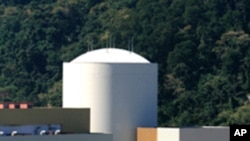Growing demands for energy around the world have nations increasingly looking to the promise of nuclear power to fuel their growth and development needs. Environmental concerns have also increased interest in atomic energy because it doesn't produce the so-called greenhouse gases believed to be contributing to global climate change.
With nuclear power's potential however, comes responsibilities. One is that nations developing nuclear energy for civilian uses commit to preventing nuclear technology from being diverted to other nations or groups that might use it to develop weapons of mass destruction. The United States is joining with other nations to promote a mechanism to bolster the market for nuclear fuel and thus aid civilian nuclear power programs of countries that comply with their nonproliferation obligations.
At a governing board meeting of the International Atomic Energy Agency, the IAEA, to be held in December, the U.S. will call on member-nations to join with it to create an international nuclear fuel bank that will provide a supply of low-enriched uranium at market prices to states in case of market disruptions. Using $150 million in donations from over 30 Member States plus the U.S.-based Nuclear Threat Initiative, the IAEA would buy 60 to 80 tons of low-enriched uranium for this purpose. Russia, a major uranium producing nation, has offered to host a similar reserve.
The U.S. has already contributed $50 million to get the project going, but time is running out. A secure and efficient market for nuclear fuel is vital for securing clean energy on a global basis. We look forward to working with both nuclear power-capable and developing nations to establish an IAEA Fuel Bank that can help to harness peaceful nuclear power for the benefit of all.
Growing demands for energy around the world have nations increasingly looking to the promise of nuclear power to fuel their growth and development needs.




